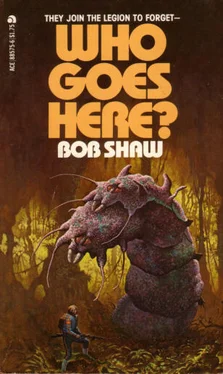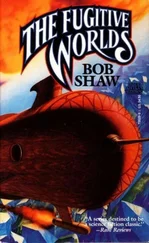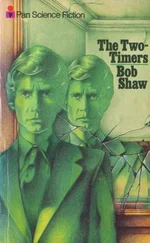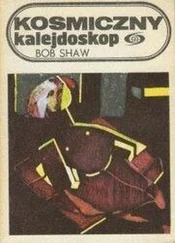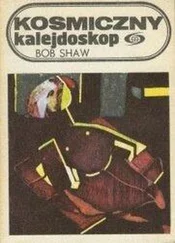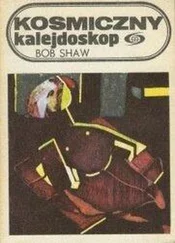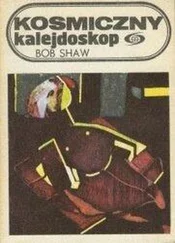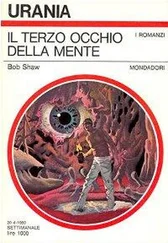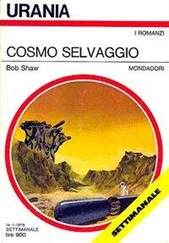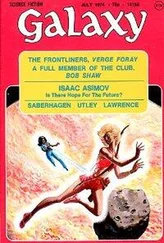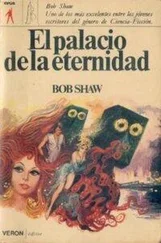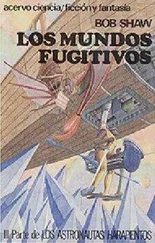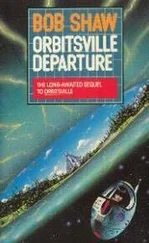Norman stopped speaking as he became aware of the expression on Peace’s face. “I can see from your eyes, my friend, that you’ve guessed what I’m going to say. Yes, it’s quite true—I am the originator of the memory eraser which is used today in every Space Legion recruiting station throughout the inhabited galaxy!”
Peace shook his head and gripped Norman’s wrist, trying to stem the flow of words, but to no avail.
“The pork pie was drugged, of course,” Norman continued, “and as soon as I became groggy that fiend Legge hustled me downstairs, opened the toilet door—a female toilet door, I might add—and threw me inside. I fell on to the seat, and the next thing I knew I was in Touchdown City of 2386.1 had overshot my departure point in time by three years—the time machine must have been in a phase of increasing oscillations.”
“Not damping oscillations,” Peace said numbly.
“I said increasing oscillations, didn’t I?” The momentary irritation faded from Norman’s face.
“I’m sorry—I realize I’ve give you quite a shock. You never expected to meet face to face with the man who invented the very machine which was used on you when you joined up, did you?”
“Not really,” Peace murmured.
“Of course, you didn’t. Perhaps now you can imagine how I felt when I learned the truth. At first I was quite pleased at finding myself in 2386—the fighting was over, and the military police seemed to have forgotten about me. I was curious to discover what Legge had been up to, so I went to a newspaper office and looked through their old files. They’re all on microfilm, of course—I was told the actual old newspapers are worth their weight in diamonds—so it was easy to turn up a complete biography on Legge.”
“What did it say?”
“That he had died in 2321, rich and famous as the inventor of the Space Legion’s memory eraser. There were no other inventions to his credit, which proves the little toad had no talent, but he’d even been given a science chair at the Aspatrian Military Academy on the strength of the eraser. Professor Legge, can you imagine? Huh!”
“Wait a minute.” Peace was desperately trying to ground himself in new realities. “You can’t blame yourself for the memory eraser. I mean it was in widespread use in 2383, and you must have known about it before you went back in time, so…”
“That doesn’t change anything. I’d heard about the eraser, naturally, but I didn’t know when it was invented. And when I got back to 2290 I was too wrapped up in my own selfish schemes to check around and find that the device was unknown at that time. Legge must have been bowled over when I proposed the idea, but he was too cunning to let me see that. He bears some responsibility, of course, but I was the prime mover—I am the arch-criminal.”
“You invented a machine to alleviate mental suffering,” Peace argued. “That wasn’t a criminal act.”
“Wasn’t it?” Norman’s lips twisted in a wan smile. “What use has that machine been put to?
Thousands of young men are lured into the Legion by the promise of forgetfulness—and what happens to them? They get killed. They die young— and now I can’t even pretend it’s in a good cause. “I was brought up to believe that the Legion exemplified everything that is fine and noble in our society. When I was a small child I used to dream about crusading through the galaxy in a tall golden ship—not realizing that the Legion’s chief function is to force people on other worlds to buy Earth’s surplus production of television sets and electric toothbrushes.”
“This is terrible,” Peace quavered, feeling the onset of a gloom which made his former state of mind seem enviable.
“It’s all right for you,” Norman said. “Try to imagine how I feel, knowing that I’m so much to blame. I know I should try to live with my guilt, accept the punishment I brought down on myself, but I just can’t go on like this any longer. As soon as I learned the full extent of what I’d done in the past, and added it to what I’d done in the present, I realized there was only one thing to do—join the Legion. To forget. Ironic, isn’t it?”
“You’re telling me,” Peace said. His head was throbbing violently with the pain of recaptured memory. Virtually his whole past was accessible to him now, and it was worse than he had feared, but most frightening of all was the realization that there was one depth he had yet to plumb. There was a black hole, a Stygian well of guilt and horror, beckoning to him. Norman had refused to discuss it, but the corrosive stains of memory were spreading into every compartment of Peace’s mind… “That was two days ago,” Norman was saying. “I didn’t want to try joining the Legion on Aspatria because there was too big a risk of somebody there recognizing me, so I bought a ticket to Earth.”
“You didn’t run into any Oscars?”
“Not this time. I was lucky.” Norman touched the wood of the table. “Perhaps they were too busy hounding some other poor sod—if so, I feel sorry for him.”
Peace nodded, scarcely listening. Two names had sprung into his mind—Ozzy Drabble and Hec Magill. Associated with the unusual names were two faces. They were thin, weather-beaten faces, stamped with the rueful expression of the Space Legion ranker, but they also contained individuality and humour. Those faces, he knew, had been important to him at some stage of his life—and there was only one slot into which they could be fitted. They had to be part of the mystery surrounding his desertion in the face of the enemy. The veils surrounding that incident were steadily being drawn aside by the forces at work inside his brain, and Peace shuddered with apprehension as he realized there was nothing he could do now to forestall the final revelation.
“Listen, Norman,” he said, seeking distraction, “aren’t you worried about anybody in the recruiting office guessing who you are? I mean, Nightingale is one of the most famous names in the Legion.”
Norman shook his head. “I’ve already taken care of that. I’m changing my name to Leo Tolstoy.”
“Tolstoy?” Peace blinked at him in surprise.
“Yes. He’s my favorite among the great Russian authors, and I’m in a gloomy Russian mood, so it seems an appropriate choice.”
“But… How does this name-changing business work?”
Norman glanced over his shoulder to make sure there were no unwanted listeners. “Lots of people who want to shake off their pasts change their names when they join the Legion. But you can’t just give a false name when you go in, because the Legion medics put you into an hypnotic trance for the memory eraser and electropsycho response conditioning, and in that state you wouldn’t respond to the alias.”
“So what do you do?”
“You go to a professional name-changer, which is another way of saying you go to a hypnotist who implants your chosen alias under deep hypnosis. It’s an illegal practice, of course, but you usually find one or two specialists in that sort of thing near every recruiting station. There’s one just along the block from here. Tomlinson, you call him—he operates under cover of being a barber, but I think he makes most of his money out of hypnotizing fugitives. That’s where I’m going in a few minutes— it’s all set up.” Norman rubbed a small clear patch in the condensation on the window beside him and peered out.
“I think I saw some lights go on over in the fort. I’d better be on my way.”
“Wait a minute,” Peace said, reluctant to be left alone with his thoughts, and still puzzled about the discrepancy in names. “Are you sure nothing can go wrong during the name-changing operation?”
“Thinking of going through it yourself, eh?” Norman gave Peace a speculative stare. “There’s no need to worry about anything going wrong— Tomlinson says his system is foolproof. He does the hypnosis with a machine. The way it works is that you print the name you want to have on a piece of paper, and you just keep staring at it while the machine puts you into the right sort of trance. It couldn’t be simpler.”
Читать дальше
